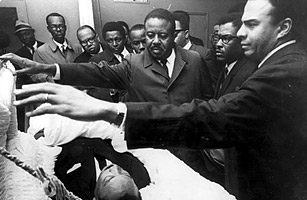
From left, civil rights leaders Abernathy, Bernard Lee and Young pay respects to their comrade King.
Apr. 4, 1968
At 6:01 p.m., the Rev. Ralph David Abernathy stood before the mirror in room 306 of Memphis' Lorraine Motel, slapping on aftershave lotion in preparation for a soul-food dinner at the home of a local minister. His close friend Martin Luther King Jr. stood just outside the door on the concrete second-floor walkway, joshing with aides from the Southern Christian Leadership Conference who, like King, were in town to support striking sanitation workers. Suddenly a sharp crack filled the air. Startled by what he thought was a firecracker, Abernathy looked out to the walkway and saw that King had fallen. Only his feet were visible, one foot protruding awkwardly through the walkway's iron railing. Abernathy rushed out, stepping over his friend to kneel by his side. Blood was gushing from a fist-size bullet wound in King's right cheek. Tenderly cradling King's head, Abernathy patted his left cheek and tried to console him: "This is Ralph, this is Ralph, Martin, don't be afraid." Moments later, another King aide, Andrew Young, checked King's pulse and told Abernathy, "Ralph, it's all over." Still rocking King in his arms, Abernathy sobbed, "Don't say that, don't say that." The grief others felt for the martyred civil rights leader would set off days of rioting across America.